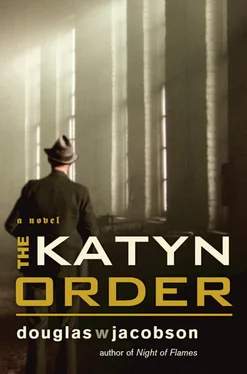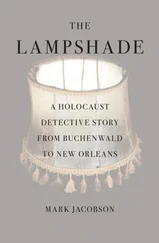Adam held the journal in his hands for a moment, then began reading. His uncle told of working in the Copernicus Memorial Library six days a week, of sleeping most of the rest of the time, of feeling tired, with a hacking cough. He wrote about a friend, Jerzy Jastremski, who urged him to see a doctor, but he declined, remembering the “hospital” at Sachsenhausen from which no one ever returned.
Then Adam read the account of a meeting his uncle had with Hans Frank, once his colleague, now his jailor, a meeting in which Frank told him about the discovery of a mass grave in the Katyn Forest where thousands of Polish officers had been murdered in 1940.
14 April 1943
He said that he had known about the murders for some time. He asked if I recalled his visitor last November. Thanks to this visitor and the gift he brought, Frank said, he has proof that it was the Russians who committed this despicable act. He said that proof—solid evidence—was always useful.
Adam set the journal down, staring out at the river. Frank’s visitor was Tarnov. It had to be. It all fit with what Captain Andreyev had reported that night on the terrace. Tarnov’s lady-friend said they went to Krakow in the fall of 1942 and Tarnov gave Frank a document. The document Frank referred to as a “gift.”
Natalia touched his arm. “You should read the last two entries.”
15 January 1945
Today I discovered the “solid evidence” Hans Frank boasted about back in April of 1943. It is a carbon copy of a single document authorizing the massacre in the Katyn Forest! I found it neatly folded in a non-descript envelope intermixed with dozens of other envelopes and file folders in the final box of documents left on the table in room L-3.
Adam’s eyes leaped to the next entry, dated 16 January:
I have translated the document. It took more than two hours… this is the essence of its contents:
On 5 March 1940, at the request of NKVD Commissar Lavrenty Beria, an order was signed by Joseph Stalin and every other member of the Soviet Politburo, authorizing the execution of twenty-seven thousand Polish “nationalists and counterrevolutionaries.” The various groups of Poles and their places of execution were itemized—including the four thousand officers of the Polish army whose graves were discovered by the Germans in the Katyn Forest.
A little later, came the last words his uncle had written:
Now, I have but one last thing for which to live. This will be my final entry of the journal. I have been up all night, and I know what I must do. The copy of Stalin’s order authorizing the massacre in the Katyn Forest must not fall into Russian hands.
To whoever reads this journal: find Adam Nowak and tell him that we shall never be pathetic pawns on the perilous chessboard of the NKVD.
Adam dropped the journal and closed his eyes, barely able to comprehend what he’d just read: his uncle, obviously quite ill after years in captivity. It was almost more than he could bear. He now realized with absolute certainty that it was all true. Tarnov had given a copy of Stalin’s Katyn Order to Hans Frank in 1942. And now he had to get it back. A chill crept down his spine as he thought about the last thing General Kovalenko had said that night on the terrace: “Dmitri Tarnov hasn’t yet found what he’s looking for… and now he’s going after your uncle.”
Natalia’s hand touched his leg. As he opened his eyes and looked at her, his emotions left him reeling. He wanted to take her in his arms, but at the same time an almost irresistible urge to run away threatened to overwhelm him. But Natalia was the one person, perhaps the only person, he knew he could trust. He told her what he knew so far about Tarnov’s search for the order.
“Then we have to find it first,” she said emphatically, “and to do that we have to find your uncle.”
“Where do we start?”
“With your uncle’s friend. His name was in the first journal entry you read.”
“Jerzy Jastremski?”
“You’re about to meet him.”
“What? Are you serious?”
“He works in the Reading Room of the Copernicus Memorial Library. You’re to go there this morning.” She ran her eyes over his new suit. “What’s your cover story for being here?”
“Whitehall arranged it,” Adam said. He felt self-conscious under her scrutiny. “I’m an American industrialist doing business with the Russian military.”
“That’s perfect. You’re a businessman doing research at the library.”
“It’s open again?”
“They’re getting ready for the university to resume classes this fall, but the library is open now. Jastremski knows where your uncle went when he left Krakow.”
“He knows? I don’t understand. How did you—?”
“I have a contact who told me. Before the war Jastremski was a librarian at the law school.”
Adam thought for a moment. A librarian at the law school. He seemed to recall Jastremski from the days when he was doing legal research for his uncle—a slender, middle-aged man sitting behind a desk at the law school library. “I think I remember him.”
“I thought you might,” Natalia said. “Jastremski will have been told to expect a visitor, but he will be extremely wary. Even if he recognizes you, he might not acknowledge it. He’s AK, but very covert, very much under cover. Banach was smuggling documents from Frank’s personal files at the library—hundreds of documents. Details about the Jewish ghettos, concentration camps, all of it passed through the channel to me. Jastremski was part of the channel, though I never knew his name until yesterday.”
“Do you think Jastremski knows about Stalin’s order?”
Natalia shook her head. “According to the journal, your uncle never shared that with anyone.”
“When I meet Jastremski, what’s the code?”
“Ask for some help finding a book. Then tell him you’re new in town. Ask him if he knows what time the mass is on Sunday at the Church of Archangel Michael and Saint Stanislaus.” She reached into a cloth bag she had been carrying, extracted a folded newspaper and handed it to him. “In the lower left-hand corner of page six I’ve written an address in the eastern section of the Kazimierz District. I’ll meet you there at three o’clock this afternoon. The room is on the third floor, number 34. The key will be behind the radiator at the end of the hall.”
Adam suddenly felt uneasy, as though an invisible force was pulling him into a place he wasn’t sure he could go.
Natalia smiled as if, once again, she had read his mind. She reached over and took his hand, then brought it to her lips and kissed it. “Three o’clock,” she said softly. “You can read the rest of the journal.”
15 JUNE
ADAM STOOD IN FRONT of the imposing multistory structure on Avenue Mickiewicza with his suit coat slung over his shoulder. He glanced up at the words Biblioteka Copernicus embossed in the stone façades above the three-meter-high, copper-clad doors of the main entrance. At least the Germans never had the chance to officially change the name. He put his coat back on and passed through the doors into a three-story circular atrium. He walked through a marble archway that led to the main floor section of the new library.
He smiled at the young woman sitting behind a semicircular, mahogany desk under a sign that read Information and asked for directions to the Reading Room.
“Take the stairs to the first floor and it will be on your right.”
Adam crossed the library’s ground floor gallery, heading for the stairs. His uncle had been instrumental in creating this place but, ironically, it had not been completed until after the German invasion. The gallery was a vast, circular room at least fifty meters in diameter with a marble floor and a high, domed ceiling depicting the heliocentric model of the universe conceived by the sixteenth-century Polish astronomer, Nicolaus Copernicus. In the center of the room stood a life-sized, bronze bust of Copernicus perched on a marble pillar. Around the perimeter of the gallery ranged shelves of periodicals and newspapers, mahogany tables and leather-backed chairs. To his left and right, marble archways led to other areas of the ground floor. And on the far side of the gallery, directly across from the main entrance, a wide marble stairway arched gracefully upward to the first floor.
Читать дальше












